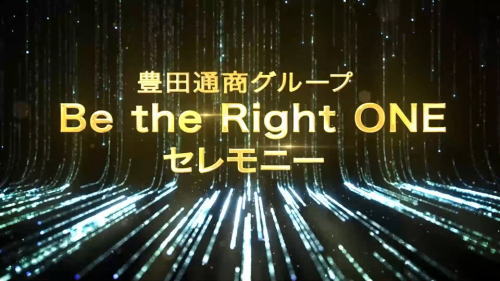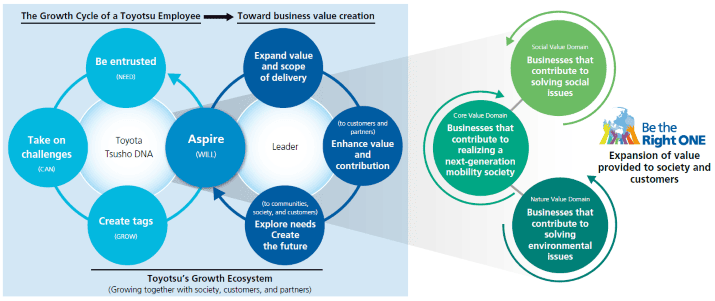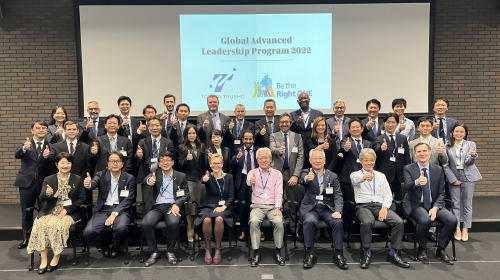Human Resources Initiatives
Human Resources Principle
We aim to realize our management strategies without being constrained by past experiences or preconceptions and based on the watchwords real source and "On site, Hands on, In touch." Accordingly, from the perspective of overall optimization, the Toyota Tsusho Group will employ, develop and advance employees who can cooperate and lead the way to an even better future.
As we conduct business on a global scale, we support respect for and ensuring human rights and freedoms as set forth in the Universal Declaration of Human Rights and the United Nations Guiding Principles on Business and Human Rights, have expressly provided for respect for human rights in the Global Code of Conduct & Ethics (COCE), and place emphasis on consideration for human rights.Furthermore, we have completely agreed to the concept of ISO 26000 which encourages the maximized contribution for sustainable development in each region and country where we conduct business and projects. With local employment and local procurement, we endeavor to co-develop with every region through human resources and to invigorate regional society and economy. We have established rules prohibiting forced labor, child labor, and labor at improperly low wages and are endeavoring to eliminate improper employment and to pay wages exceeding minimum wages in compliance with the labor laws and regulations of each country.
In unavoidable cases such as business location closures, we prioritize maintaining employment by considering reassignment or transfers to nearby group companies. If dismissal becomes necessary as a last resort, we strictly comply with local labor laws and engage in sincere, thorough communication with employees.
The Toyota Tsusho Group promotes diversity, equity & inclusion as a management strategy. We are striving to create work environments that bring out the strengths of diverse personnel by undertaking reforms to implement more flexible and productive ways of working. We are also working to develop human resources that can create business on a global scale and that can achieve success in the global market while providing occupational training opportunities to local communities, and we actively developing human resources within and outside the company that are valuable to and contribute to society.
Point1: Build an environment that allows employees to work with vitality.
To enable a company and its employees to realize continuous growth, it is essential to create a workplace environment and systems that make employees' work rewarding and fulfilling. With this in mind, we are devising a number of measures to build such an environment and systems.
Point2: Create frameworks for promoting constant and autonomous reforms and kaizen.
We regard a company's responsibility as enabling employees to act with self-initiative, with an unceasing desire to pursue reforms and kaizen (continuous improvement). Toyota Tsusho is building systems and frameworks that promote such actions.
Point3: Develop human resources with curiosity and interest in the global management environment and capable of responding flexibly, quickly, and sincerely to changes in the environment.
The management environment is evolving at a breathtaking pace. Even so, we will work to strengthen our business functions and develop human resources capable of swiftly undertaking sincere business activities.
Point4: Promote teamwork with an eye toward overall optimization as an organization.
We are building organizations that enable overall optimization by respecting individuality and including diversity. To do so, we believe it is essential to have a corporate culture that fosters mutual respect and ensures sufficient vertical, horizontal and diagonal communication. We are currently creating a framework for such a corporate culture.
Human resource management
1. Basic stance
We strive to operate a grade system based on diverse talents and work styles, a fair evaluation and promotion system that fosters employee growth, and a compensation system based on performance.
Toyota Tsusho bases all its HR initiatives—hiring, training, appraisal, and transfers—on two pillars: human capital development and organizational dynamism. By supporting the growth and success of its diverse global workforce of 70,000 employees, Toyota Tsusho cultivates talent that creates unique business value.
To achieve this, we aim to provide an environment where each employee can fully demonstrate their potential in terms of knowledge, skills, and abilities, contributing to organizational goals and enhancing Toyota Tsusho's corporate value.
In fiscal 2025, we revised our grading system to clarify expected roles for each position and expand new career fields. The goal is for individuals to deliver results in the roles where they can shine most, thereby driving company growth.
Our evaluation system promotes human capital development by assessing annual achievements and clarifying future actions. Calibration meetings are held at each stage of the evaluation process to ensure fair treatment from multiple perspectives.
Our remuneration system consists of salaries determined by job level and bonuses based on company performance and individual evaluations. The performance-based bonus system fairly rewards each employee's continuous self-improvement, efforts, and results.
Additionally, Toyota Tsusho operates a stock ownership plan available to all employees. Under this plan, employees can contribute a fixed amount from their monthly salary and bonuses to purchase company shares. To encourage participation, the company provides a matching incentive on contributions. This stock ownership plan enhances employees' sense of involvement in company management and promotes retention by increasing employee assets through stock price appreciation.
As of June 2025, the plan has 2,490 individual members, representing a participation rate of 68.7%.
We conduct MBO (Management by Objectives) training at the start of each fiscal year and assessment training at the end. These trainings aim to establish clear goal-setting agreements and improve feedback quality to support employee growth.
Throughout the year, we hold four mandatory interviews (at the start, middle, end, and feedback stages). We emphasize building trust between evaluators and employees through regular, close communication such as one-on-one meetings.
Each year, all evaluated employees receive a questionnaire on evaluation feedback. The results are used to improve MBO and assessment training and enhance communication between evaluators and employees.
Starting in fiscal year 2023, we introduced multi-faceted feedback for line managers, collecting input from supervisors and subordinates. This provides managers with objective insights into their management styles and opportunities to improve management quality.
In fiscal year 2023, we introduced a talent management system that enables setting targets considering both career goals and performance goals.
Starting in fiscal year 2025, we implemented a new career goal-setting form called "MCV (My Career Vision)" to help employees clarify their career paths. We continue to provide company-wide support and opportunities for employees to achieve their desired careers. By centrally managing this information, we also promote its use for human resource development as well as transfers and assignments that encourage autonomous growth.
Regarding performance goals, management and some associate positions are required to include items related to "Contribution to Maximizing Organizational Capability." We evaluate initiatives such as human resource and organizational development, encouraging proactive efforts by individuals to build stronger people and organizations.
2. Challenge Rotation
The purpose of this system is to promote personnel changes that respect the career direction and aspirations of each employee as much as possible.
The purpose of this system is to promote personnel transfers that respect the aspirations and autonomous growth of each employee as much as possible. Interviews are held with the preferred department for transfer and when the needs of both sides match, the employee can be preferentially assigned.
Toyota Tsusho has a Challenge Rotation system, arranged by the Human Resources Department, under which every effort is made to assign employees to their desired department. There is also a Challenge Post system, under which applicants are assigned to departments according to organizational needs.
These programs support not only global employees but also senior staff leveraging their experience in new environments, as well as regional employees seeking transfers involving location changes.
In fiscal 2024, 25 transfers were completed out of 54 applications through these programs.
3. Commendation systems
We present commendations to organizations and employees contributing to the realization of our corporate vision, judging their achievements from diverse perspectives.

From among those awards, organizations are further selected for the "Best Division Award," "Vice President's Award" and "President's Award."
The 2023 President's Award was given to the "Power Transmission Project for Wind Power Generation in Northern Hokkaido," carried out across one city and five towns in northern Hokkaido. The adjacent battery storage capacity of 720 MWh is the largest in Japan. Over five years, approximately 600 construction workers and about 700 personnel including developers were involved in building 78 km of transmission lines. This workforce movement significantly contributed to revitalizing the local economy. The project enables approximately 540 MW of new wind power generation with the installation of nine new power plants and 127 wind turbines, greatly advancing the spread of renewable energy.
Additionally, to encourage employee certification acquisition, we recognize employees' achievements and provide monetary awards based on the qualifications obtained. This actively supports employees' autonomous skill development and certification efforts.
Human resource development
1. Basic Approach
Toyotsu's Growth Ecosystem
In today's rapidly changing business environment, creating value in the business domains we aim to expand—such as addressing social and environmental challenges—requires our employees to continuously pursue new growth. The "Toyotsu's Growth Ecosystem" is a framework that accelerates organizational and corporate growth by harnessing the individual development of each employee, grounded in the Toyota Tsusho DNA and learning agility, ultimately delivering value to our customers and society.
Employees tackle customer challenges firsthand on-site, cultivating their own unique "tags" through practical experience. This process sparks new aspirations—what they aim to achieve next or how they want to contribute to solving social issues—and creates opportunities for them to take on new roles and responsibilities. Growth beyond grade and age is fostered through initiative and challenge. "The Growth Cycle of a Toyotsu Employee" models these growth processes and serves as the foundation of our talent development framework.
Through this Growth Ecosystem, Toyota Tsusho drives the creation of future business value and contributes to building a better society.

2. Education and Training
Training System Based on the Concept of Autonomous Career Development
We believe that employees' autonomous approach to their own careers contributes most to their growth and is also vital for the company's development. Based on this concept of self-directed career formation, we offer a wide range of training programs covering career support, business skills, leadership, and more. These programs are freely available to all employees regardless of grade or position.
In addition to global common training for developing management talent and leaders, we offer pre-assignment training for overseas postings—covering cross-cultural understanding—as well as common skill training in areas such as marketing and digital literacy.
These trainings can be selected according to each individual's needs and are offered in various formats, including online courses accessible from anywhere.
We continue to focus on developing talent who can contribute globally and across divisions.

- GALP (Global Advanced Leadership Program)
GALP is our most prestigious in-house program, conducted in partnership with leading overseas business schools. Over approximately six months, selected next-generation management candidates from around the world discuss our company's purpose and vision in the global market, as well as their own leadership. Through action learning, participants deeply explore their personal aspirations and collaboratively propose next-generation management strategies. The program is dedicated to developing global leaders who can thrive with high ambition in multicultural environments.
As of November 2024, 30.6% of past GALP participants hold key global positions deemed critical to our consolidated management. Additionally, as a new initiative, we have established "alumni activities" for former participants, providing a platform centered on innovation to exchange information and continuously build a global network.
- HCP (Hybrid Communication Program)
As leadership and communication styles evolve to meet the challenges of managing diverse people and organizations, we offer HCP to help managers acquire a variety of communication skills tailored to each member's personality, strengths, and development stage. By reflecting on their role as leaders and their own style, managers foster proactive dialogue with each team member, realizing both strong individuals and a strong organization.
The program also strengthens networks among managers, promotes workplace initiatives, and contributes to improving employee engagement and organizational culture.
As of the end of 2024, a total of 478 managers have completed the program, and about 70% of management in the top 50 organizations with high employee engagement have participated in HCP.
- Overseas Business Trainee Assignments
At Toyota Tsusho, we provide junior global employees with the opportunity to gain one year of overseas business trainee experience within their first eight years at the company. The purpose of this initiative is to help young employees broaden their international perspective early and expand their career options. By experiencing diverse cultures and business environments, they develop flexible thinking and problem-solving skills.
As of 2024, 77.5% of eligible employees have completed overseas assignments, supporting the company's growth.
The average overseas experience rate for global employees within their first eight years (based on the past three years) is 77.5%.*Overseas experience: overseas postings, business trainee assignments, language trainee, and similar programs.
- Overseas Language Trainee Program
To develop talent capable of deeply understanding local languages and cultures and promoting business rooted in those regions, we offer an Overseas Language Trainee Program for junior global employees.
Participants first study the basics of a second foreign language—such as French, Chinese, Spanish, Portuguese, or Arabic—at language schools in Japan, then undertake one year of language study at a local university or language institution abroad. This program not only enhances language skills but also fosters familiarity with local culture, climate, and business customs, contributing to employees' career development and revitalizing job rotation opportunities.
Overseas language intern program: training destinations and number of trainees (Toyota Tsusho)
Study destinations (2021): France 3 (total 3)
Study destinations (2022): France 1 (total 1)
Study destinations (2023): France 2, Brazil 1 (total 3)
Study destinations (2024): France 2, Brazil 1,China 1 (total 4)
Study destinations (2025): France 1, Brazil 1,China 1 (total 3)
| Total training hours | Total costs | Average training hours per employee | Training costs per employee |
|---|---|---|---|
| 116,417 hours | 650 million yen | 35.8 hours | 200,000 yen |
Scope of Aggregation:Toyota Tsusho Corporation
*Refer to the URL below for details of training held by the Global Human Resources Department.
